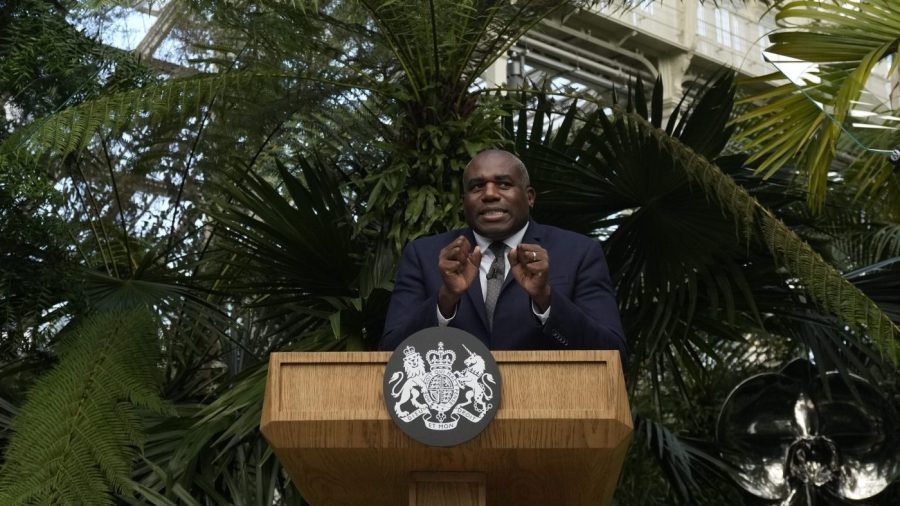Just In News
Britain’s new foreign secretary, David Lammy, has been in office for 11 weeks. Restless and energetic by nature, he had been preparing for the job for two-and-a-half years. He is now impatient to reshape U.K. foreign policy and show that the recently elected Labour government is very different from its Conservative predecessor.
Lammy is a political veteran. He became a Member of Parliament a quarter of a century ago at the age of 27 and was a government minister under Tony Blair and Gordon Brown. A Harvard Law School alum who practiced as an attorney in California in the late 1990s, he is a forceful speaker who knows how to grab headlines. This flair for publicity was on full display on Sept. 17, when he made his first set-piece speech on international affairs at the Royal Botanic Gardens on “the most profound and universal source of global disorder — the climate and nature emergency.”
Today, even to address the issue of climate change is to make ears prick up on both left and right. Where once there was widespread consensus on the case for global warming, there is now sharp division. Former President Donald Trump has downplayed the extent of the human contribution to climate change and dismissed global warming as a “hoax,” while five years ago this week an angry Greta Thunberg blinked back tears and berated the UN Climate Action Summit for its failings.
Lammy pulled no punches. The climate crisis is “the central geopolitical challenge of our age,” a threat “more fundamental” than “a terrorist or an imperialist autocrat.” He warned: “It is systemic. It’s pervasive. And accelerating towards us at pace.”
This comparison with terrorism and “an imperialist autocrat,” presumably loose code for Vladimir Putin, is dramatic. Lammy’s underlying argument is that the effects of a changing climate are not separate from traditional issues of geopolitics and international security; rather, they are intimately intertwined with them. He promised that during his tenure “action on the climate and nature crisis will be central to all that the Foreign Office does.”
Lammy is not wholly wrong. Whatever one’s views on the cause and extent of climate change, it is already having an effect on global security. Melting ice in the Arctic is opening up previously inaccessible reserves of oil and gas, and in response Russia has reopened Cold War-era military bases and redrawn its naval strategy to reinforce its territorial claims.
Increasingly inhospitable conditions in the Sahel have contributed both to political instability in that African region and to increasing migration towards Europe. Some analysts have argued that a protracted period of drought contributed to the Syrian civil war, which has so far killed 618,000 people and displaced 13 million. These are “facts on the ground” that Western foreign policy has to take into account.
On the other hand, climate change is not the same type of threat as terrorism or state aggression, and it is much more susceptible to methodical scientific analysis and mitigation. This creates the danger that Lammy’s publicity-seeking narrative may be viewed as scaremongering or distorting the government’s priorities. In the U.S., one in five people thinks human activity has little or no effect on climate change, and a quarter of Republican voters believe the federal government is already doing too much to mitigate environmental changes.
As the American presidential election draws ever closer, British politics is becoming fixated on the possible consequences of a victory for Vice President Kamala Harris or Trump. The Labour government knows it would have a much more comfortable and harmonious relationship with a Democratic president, but it is also aware that polls show only a slender lead for Harris, with a real possibility of a Trump victory. If that happens, will Lammy’s bold stance come back to haunt him?
The foreign secretary has already had to explain away a track record of critical remarks about Trump. While he has built some bridges with figures in Trump’s circle — like Elbridge Colby, a possible National Security Advisor in the event of a GOP victory — his decision to place climate change at the center of British foreign policy risks a sharp difference in approach.
A likely Trump approach to the world includes an energy boom based on fossil fuel, scrapping investment in “meaningless Green New Scam ideas” and a second withdrawal from the Paris Agreement on climate change. Lammy could scarcely have chosen an area in which there are more potentially deep divisions between the U.S. and the U.K.
The foreign secretary’s fundamental analysis, that changes in the environment are what NATO describes as a “threat multiplier,” is sound. But by placing climate change at the heart of his decision making, he has upped the ante substantially. Is he aware of the risk or in danger of a rude awakening?
Eliot Wilson is a freelance writer on politics and international affairs and the co-founder of Pivot Point Group. He was senior official in the U.K. House of Commons from 2005 to 2016, including serving as a clerk of the Defence Committee and secretary of the U.K. delegation to the NATO Parliamentary Assembly.
International, Opinion Read More
Author Profile
Latest entries
 HeadlinesSeptember 25, 2024Migrant crime crisis comes to Nantucket, Martha's Vineyard, playgrounds for rich and famous
HeadlinesSeptember 25, 2024Migrant crime crisis comes to Nantucket, Martha's Vineyard, playgrounds for rich and famous HeadlinesSeptember 24, 2024The Midwest could offer fall’s most electric foliage but leaf peepers elsewhere won’t miss out
HeadlinesSeptember 24, 2024The Midwest could offer fall’s most electric foliage but leaf peepers elsewhere won’t miss out ScienceSeptember 24, 2024Antidepressant may treat deadly brain cancer
ScienceSeptember 24, 2024Antidepressant may treat deadly brain cancer HeadlinesSeptember 24, 2024Israel, Hezbollah resume missile launches after conflict's deadliest day since 2006
HeadlinesSeptember 24, 2024Israel, Hezbollah resume missile launches after conflict's deadliest day since 2006

